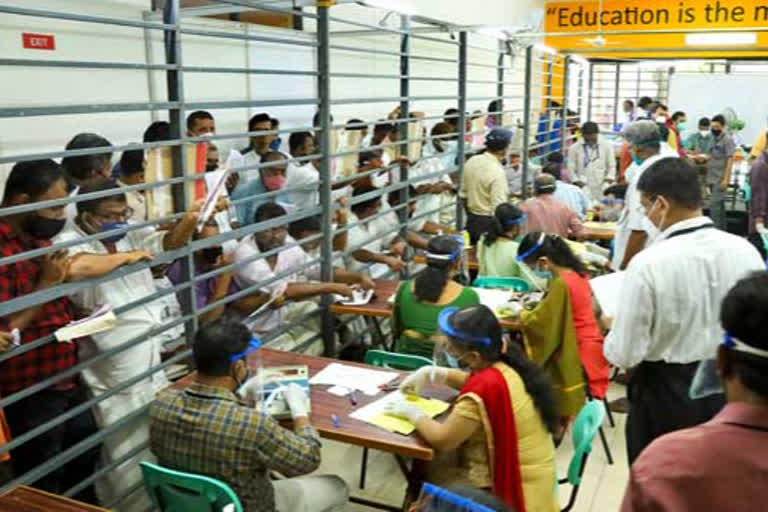New Delhi:Counting of votes will be held on Sunday in the high-stakes Assam, West Bengal, Kerala, Tamil Nadu and Puducherry assembly elections, overshadowed by the raging COVID pandemic, as the BJP seeks to consolidate its hold over more states and the Congress along with its allies attempts to regain lost turf.
There will be 2,364 counting halls as compared to 1,002 halls in 2016 in 822 assemble constituencies, a more than 200 per cent increase, because of the COVID guidelines, according to the Election Commission which had drawn flak from the courts over the conduct of polls during the pandemic.
At least 15 rounds of sanitisation will be carried out at each polling centre, besides social distancing and other precautions, including a ban on gatherings, will be strictly followed, officials said.
Read:|Assembly Polls: EC issues detailed guidelines for counting
They said counting of votes will begin at 8 AM and continue late into the night. As many as 1,100 counting observers will watch the process and candidates and agents will have to produce a negative COVID test report or double dose of vaccination certificate to get an entry.
Exit polls have forecast a tight contest between the incumbent Mamata Banerjee-led Trinamool Congress and the BJP in the crucial West Bengal assembly polls and put the ruling saffron combine ahead in Assam while projecting that the Left alliance will retain Kerala, a feat unseen in four decades.
For the Congress, the exit polls predicted that it may fall short in Assam and Kerala and lose in Puducherry to the opposition alliance of AINRC-BJP-AIADMK.
The only good news for the Congress was from Tamil Nadu, where the exit polls predicted that the DMK-led opposition alliance, of which it is a part, will trounce the AIADMK-BJP coalition.
The poll results in the four states and the UT are also likely to reflect how the handling of the COVID pandemic has played on the voters' mind.
Kerala, Tamil Nadu and West Bengal are among the 11 states that account for 78.22 per cent of the total active cases, according to the Health ministry.
A three-tier security arrangement is in place in West Bengal's 108 counting centres and at least 292 observers have been appointed and 256 companies of central forces deployed across 23 districts of the state that voted in a gruelling election marred by violence and vicious personal attacks.
The result will decide whether Mamata Banerjee, who has been in power for 10 years and is arguably fighting the toughest poll of her political career, has been able to thwart the challenge by the battle-hardened election army of the BJP led by Prime Minister Narendra Modi and Home Minister Amit Shah.
Read:|EC bans victory rallies on counting day amid COVID surge
The BJP, which had just three seats in the 294-member Assembly in the 2016 Assembly polls and went to win 18 out of 42 seats in the 2019 Lok Sabha election, had pulled out all stops in the state in a determined bid to oust Banerjee, a vocal critic of Prime Minister Modi, and add another state to its tally of 17.
The Left-Congress alliance is the third main contestant in the state.
In Tamil Nadu, both Dravidian parties -- AIADMK and DMK -- went into the election without their stalwarts, J Jayalalithaa and M Karunanidhi.
Chief Minister K Palaniswami and his deputy O Panneerselvam will cement their position as successors of Jayalalithaa if the All India Anna Dravida Munnetra Kazagham (AIADMK) retains power though it faces an uphill task especially after the rout in the 2019 Lok Sabha election when the DMK-led alliance won 38 out of 39 seats.
The AIADMK had scored successive wins in 2011 and 2016 when Jayalalithaa bucked the anti-incumbency trend -- the first by anyone in nearly three decades in the state.
After a narrow defeat in the last assembly election where several exit polls had predicted his party's win, Dravida Munnetra Kazhagam (DMK) chief M K Stalin spearheaded a determined election campaign this time and vigorously toured the state to take on the ruling AIADMK.
